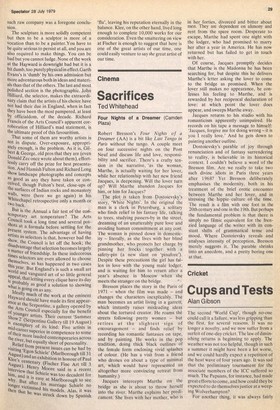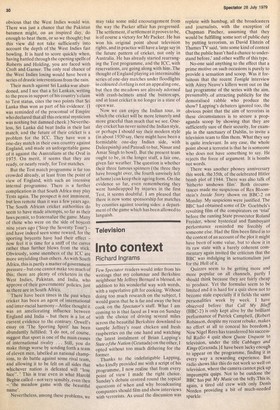Cricket
Cups and Tests
Alan Gibson
The second 'World Cup', though no-one could call it a failure, was less gripping than the first, for several reasons. It was no longer a novelty, and we now suffer from a surfeit of one-day cricket. The law of dimin, ishing returns is beginning to apply. The weather was not too helpful, though in such a summer it might have been a lot worse, and we could hardly expect a repetition of the heat wave of four years ago. It was sad that the preliminary tournament for the associate members of the ICC suffered so much. The Papuans, for instance, had made great efforts to come, and how could they be expected to do themselves justice at a weeping Wolverhampton?
For another thing, it was always fairly obvious that the West Indies would win. There was just a chance that the Pakistan batsmen might, on an inspired day, do enough to beat them, or so we thought; but this view did not take sufficiently into account the depth of the West Indies fast bowling. It is hard to score quickly when, having battled through the opening spells of Roberts and Holding, you are faced with Croft and Garner. The only real chance of the West Indies losing would have been a series of drastic interventions from the rain.
Their match against Sri Lanka was abandoned, and I see that a Sri Lankan, writing to the press in support of his country's claim to Test status, cites the two points that Sri Lanka thus won as part of his evidence. (I was reminded of the proconsul of Empire who declared that all this oriental mysticism was nothing but damned cheek.) Nevertheless, Sri Lanka did beat India in their last match, and the future of their cricket is a problem for the ICC. They have won a one-day match in their own country against England, and made an unforgettable game of it against the Australians at the Oval in 1975. On merit, it seems that they are ready, or nearly ready, for Test matches.
But the Test match programme is far too crowded already, at least from the point of view of England, with such an intensive internal programme. There is a further complication in that South Africa may play Tests again. The prospect is not imminent, but less remote than it was a few years ago. The South African cricket authorities do seem to have made attempts, so far as their laws permit, to fraternalize the game. Many of those who were on the side of boycott nine years ago ('Stop the Seventy Tour') — and have indeed seen some reward, for the sporting boycotts have had their effect — now feel it is time for a sniff of the carrot rather than further blows froni the stick. Obviously, some members of the ICC are more unyielding than others. As with South Africa, this is partly a matter of government pressure — but one cannot make too much of this; there are plenty of cricketers in the West Indies, Pakistan, and India, who approve of their governments' policies, just as there are in South Africa.
There have been times in the past when cricket has been an agent of international and inter-racial harmony—Attlee thought it was an ameliorating influence between England and India — but there is a lot of current evidence to the contrary. Orwell's essay on 'The Sporting Spirit' has been abundantly fulfilled: 'I do not, of course, suggest that sport is one of the main causes of international rivalry . . . Still, you do make things worse by sending forth a team of eleven men, labelled as national champions, to do battle against some rival team, and allowing it to be felt on all sides that whichever nation is defeated will "lose face". This is true even in what Harold Begbie called — not very sensibly, even then — 'the meadow game with the beautiful name'.
Nevertheless, among these problems, we may take some mild encouragement from the way the Packer affair has progressed. The settlement, if settlement it proves to be, is of course a victory for Mr Packer. He has won his original point about television rights, and in practice will have a large say in the future pattern of cricket, not only in Australia. He has already started rearranging the Test programme, and the ICC, with reservations, are going along with him. The thought of England playing an interminable series of one-day matches under floodlights in coloured clothing is not an appealing one, but then the meadows are already adorned with crash-helmets amid the buttercups, and at least cricket is no longer in a state of open war.
Now we can enjoy the Indian tour, in which the cricket will be more leisurely and more graceful than much that we see. Oneday cricket has never suited the Indian style, or perhaps I should say their modern style (in about 1930 say, there might have been a formidable one-day Indian side, with Duleepsinhji and Pataudi to bat, Nissar and Amar Singh to bowl). But the present team ought to be, in the longer stuff, a fair one, given fair weather. The question is whether their three famous spinners (the three they have brought over, the fourth unwisely left at home) can keep their ageing form. On the evidence so far, even remembering they were handicapped by injuries in the first Test, it seems doubtful. I am pleased that there is now some sponsorship for matches by counties against touring sides: a department of the game which has been allowed to languish.







































 Previous page
Previous page